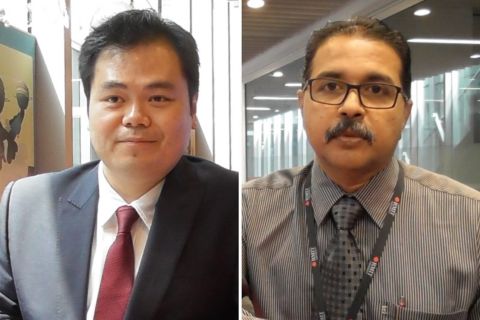Dr Swenddal said she was thrilled to be the first PhD graduate for her thesis: Free Agents on Underdog Teams: International Branch Campus Lecturers Constructing the Organizational Integration of their Individual and Campus Identities.
“Launching the PhD program in 2016 was a milestone achievement for RMIT Vietnam and it was my honour to be a part of this programs' inaugural run,” she said.
Dr Swenddal was employed at RMIT where she held a series of leadership and management positions that piqued her interest in the science of management.
“I worked for several years in the Office of the Vice President Academic – a role which gave me insights into the challenges of coordinating academic programs across locations in multinational universities like RMIT,” she said.
“I became interested in international branch campus management, specifically in the ways that lecturers working at these sites viewed their roles and their campuses in connection with the wider university.”
She began her PhD in 2016, and did most of her field research and began the long process of analysing the data in 2018.
“For my PhD, I travelled to different international university campuses in Asia to interview academic staff, and building theories about their identity constructions based on what I found,” she said.
In mid-2018, Dr Swenddal and her husband left Vietnam and returned to the US.
“From that point forward, my journey became more independent,” she said. “My supervisors and I checked in regularly – navigating a 12-hour time difference – but much of my work was done alone at home.”
Her research identifies a type of parent-campus coordination style that encourages and impedes cross-campus connection which could prove useful for university leaders in improving cross-campus university relationships.
Dr Swenddal said, “Broadly, I found that many branch-campus lecturers in the contexts I studied operate at a kind of double-remove from their parent campuses. They see their campuses as separate from their universities and themselves as separate from their campuses. However, this sense of separation was not widely desired. Participants wanted to feel more connected with their institutions, but challenges in cross-campus management impeded this sense of connection.”
Dr Swenddal said RMIT Vietnam has played a special role in her life, even beyond her PhD journey.
“I first joined RMIT University in Vietnam as an English-language teacher in 2008, and after returning to the US to complete my master's degree in English education, I moved back to my beloved Saigon South campus in 2012,” she said. “When the opportunity arose to pursue a PhD in management at RMIT Vietnam, I jumped at the chance. And I was fortunate to have two incredible supervisors: Professor Mathews Nkhoma and Dr Sarah Gumbley.”
Mathews Nkhoma is the Head of the School of Business and Management.
He said: “Dr Swenddal's research makes a valuable contribution to the emerging field of transnational education management and has been well received by international academic audiences.”
“It explores employee-led organisational identity development in global universities, which similar to multinational enterprises, involves diverse staff working across significant geographical distances.
“Her grounded theory study of offshore university lecturers’ identity constructions reveals the sense of isolation that these lecturers feel from their university headquarters and the consequences of their isolation on brand alignment and representation.”
Dr Swenddal, who is now Assistant Professor of Management at Nichols College in Massachusetts, USA, said she was grateful that she decided to pursue the PhD. “The rewards have been incredible!” she said. “However, although my PhD journey had many joys, it was also very challenging.”
Her advice to potential PhD students is “to take a holistic approach to considering whether and when to pursue a PhD.”
“Doing a PhD is often compared to running a marathon: It is an endurance sport, requiring years of steady effort. Having a research area you want to explore is important, but your health, habits, professional life and family situation will also help to determine your success.”
“I was fortunate in my PhD pursuit because I had a job with flexible working hours, a strong support network, and several years of academic experience from my master's degree studies. Perhaps most importantly, I had the work ethic and emotional stamina to keep progressing despite challenges, which are constant in a PhD journey.
“My fabulous supervisors and wonderful husband, Joel, inspired me to recover from setbacks and keep advancing the work. I owe my success to the combination of these factors, which all perfectly aligned for me in this particular moment in time. I am lucky that 2016 was the year RMIT launched PhD programs in Vietnam! I am grateful to have had this incredible honour.”
Story: Ha Hoang





